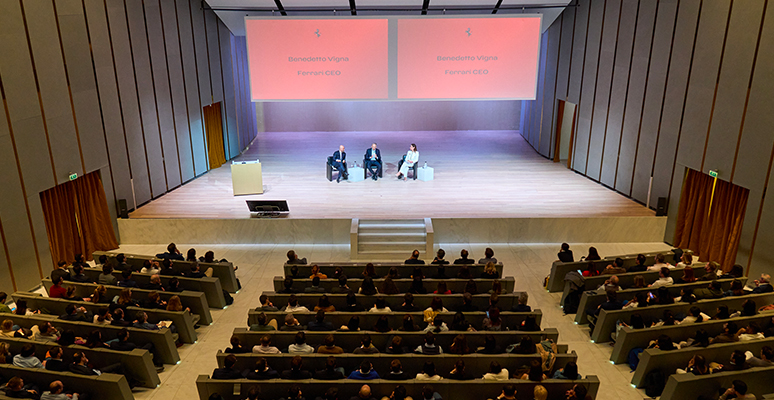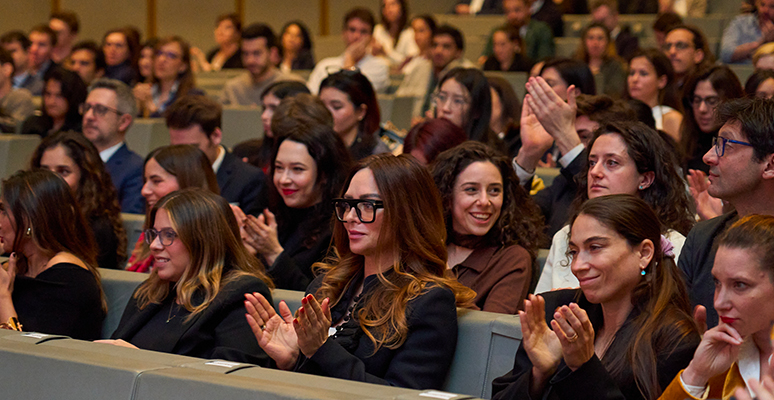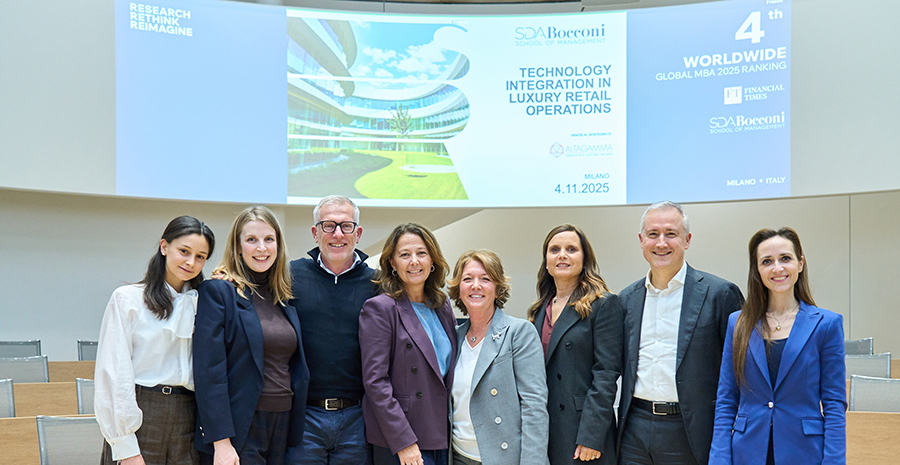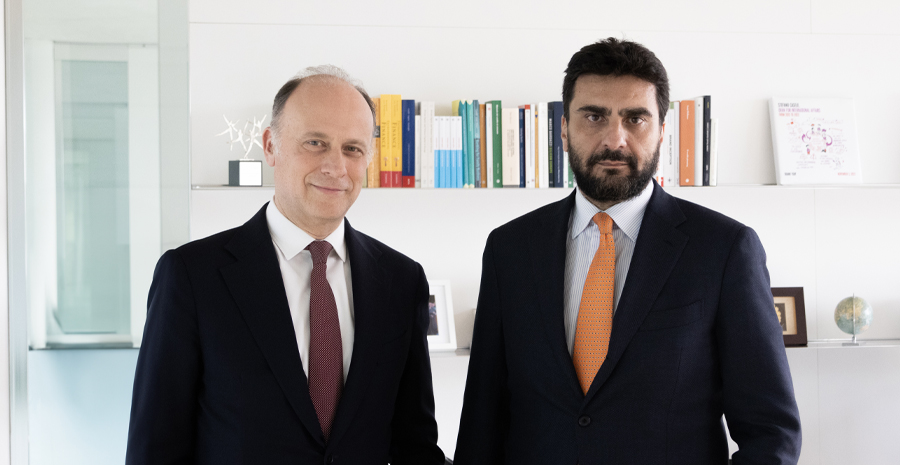
- Start date
- Duration
- Format
- Language
- 2 Dic 2025
- 4,5 days
- Class
- Italian
Few names ignite the imagination like Ferrari. And few occasions draw such anticipation. A special keynote event featuring Benedetto Vigna, Ferrari CEO – held as part of the Executive Master in Luxury Management alumni get-together – became a shared moment of learning and inspiration, open to students and alumni from across the School’s master programs.
Vigna discussed the values and strategic choices that shape the soul of a luxury icon. It was not just a keynote, but an exploration of mindset: one that wove together physics and philosophy, high-performance engineering and human values, exclusivity and community.
The event was introduced by SDA Bocconi Dean Stefano Caselli, who welcomed the audience by reminding them that “school and management” are not separate ideas, but two sides of a shared mission, one grounded in research, community and values. Enzo Baglieri, Associate Dean for the Masters Division, and Gabriella Lojacono, Director of EMiLUX, then framed the evening’s theme by highlighting Ferrari’s dual identity as both a symbol of exclusivity and inclusivity, being also a brand deeply rooted in its community.
Vigna, who took the helm of Ferrari in September 2021 after a decades-long career in microelectronics, wasted no time getting to the heart of what makes Ferrari unique. “We are a luxury company, not an automotive company,” he said. That distinction, he explained, reshapes how Ferrari approaches every decision, from technology and design to how it builds emotional connections with its customers and fans.
A physicist by training and inventor by nature, Vigna spent more than 25 years at STMicroelectronics, where he founded the MEMS division (Micro-Electro-Mechanical Systems) and helped bring motion-activated sensors into everyday life. With more than 200 patents to his name and a track record of industrial innovation, Vigna's entry into the world of luxury could have been jarring. Instead, he brought a fresh perspective, one that respects tradition while refusing to stand still.

At Ferrari, he sees innovation not as a race to be first, but as a responsibility to be right. “Technology-push alone isn't good,” he noted. “Market-pull isn't enough either. What matters is anticipating, understanding what the client wants emotionally, not just what the technology can do.”
Ferrari, he explained, doesn’t organize itself around exclusivity for its own sake. Instead, he described the company’s structure as an hourglass: less than 30,000 clients each year(broadly speaking, half purchasing new cars, half pre-owned), balanced by a global community of fans in the millions. Events like the Half Marathon of Italy “Memorial Enzo Ferrari” or the brand’s signature Cavalcade road trips are designed to celebrate that wider community, reinforcing the emotional bond between Ferrari and the people who believe in it.
Two stakeholders remain central to that vision: the clients and the fans. “It’s a balance of storytelling, technology and sport,” Vigna stated. “We have two eyes: one looking to the past, the other to the future and one brain to bring them together.”

Vigna also spoke candidly about the changes he brought to Ferrari’s internal culture. One of his first moves was to foster more open communication. “I talk to everyone, not just senior management. I eat in the canteen. I walk the line.” He also expanded Ferrari’s supplier base beyond Europe to include Korean, Japanese, and American partners. A nod to his experience in global high-tech ecosystems.
Most importantly, he addressed innovation anxiety head-on. In industries like microelectronics, he said, failure is part of the process. At Ferrari, he worked to reduce the fear of making mistakes, encouraging teams to adopt a mindset of “Try, Learn, Adapt, Nimbly”, fast, but without fear. His leadership mantra, DSA - Delete, Simplify, Accelerate - encapsulates his belief in removing what doesn’t add value to make space for what does.
The conversation turned, too, to the people behind the brand. “Ferrari is powered by individuals with curiosity, drive and a deep sense of responsibility," Vigna explained. Drawing on a framework from organizational psychologist Adam Grant, he said he looks to hire “scientists”: people who ask questions, follow evidence and revise their views. “We don't want prosecutors or preachers,” he added. “We want people who know how to help their teammates and show up, even when the boss isn’t around.”
To anchor this mindset, Vigna introduced six guiding principles: collaboration, continuous learning, confident humility, focus, fearless organization and will to progress. The last one, he said, is what keeps Ferrari moving forward without ever becoming complacent. “Success can make you forget the beauty of failure,” he warned. “We need to stay with all four wheels on the ground.”
Asked about Ferrari's future, Vigna pointed to the strategic pillars of the Company: racing, sports cars and lifestyle. All are rich with potential, including new records in sponsorship, a revenue stream Ferrari is now prioritizing. And while growth is on the horizon, acquisitions are not. “Strategy isn't something you define once and follow forever. It’s like a white line on the road: you keep adjusting.”
Ferrari keeps its focus not on the rearview mirror, but on the road ahead, and Vigna’s parting words captured that philosophy: “The past does not guarantee the future. It’s hard to climb but easy to fall.” For the diverse community of SDA Bocconi alumni and students present, that mindset struck a chord - a call to lead not with the pursuit of certainty, but with vision and velocity.
SDA Bocconi School of Management



The program equips you with tools to identify your team's strengths and challenges, adapting your leadership style to enhance team effectiveness.

